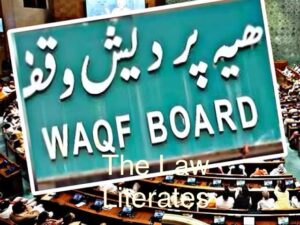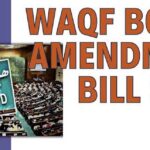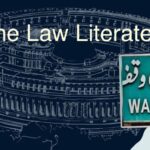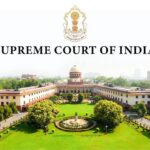WAKF BOARDS: GUARDIANS OF HERITAGE OR FACING A CRISIS ?
WAKF BOARDS: GUARDIANS OF HERITAGE OR FACING A CRISIS?
INTRODUCTION
The word “Wakf” literally means detention, stoppage, or tying up of something. According to the law, wakf refers to the donation of a property by its original owner for religious purposes. The property given by the original owner is intended for charitable purposes. This means that a person belonging to the faith of Mussalmans alienates themselves from their property in the name of charity. The concept of Wakf was developed in Islamic law and was not practiced in Arabia before the advent of Islam. This concept is not mentioned in the Quran. According to Sayed Ameer Ali, it is “the most important form of Muslim law, for it is interwoven with the entire religious life and social economy of Muslims.” One of the Hadiths of Prophet Mohammad states: “A person went to the Prophet and said that he had property; what should he do with it? The Prophet said, ‘Give it in the name of Allah and let its receipts go to charity.”
According to Section 2(1) of The Mussalman Wakf Validating Act, 1913, wakf means “the permanent dedication by a person professing the Mussalman faith of any property for any purpose recognised by the Mussalman law as religious, pious, or charitable.” A wakf can be created through a written deed or orally. If the wakf is documented through a written deed, it is called a Wakfnama. Properties donated by Muslims under wakf are governed by a system of Waqf Boards, which exist at both state and central levels. State-level Waqf Boards appoint caretakers for these donated properties, manage revenue details, and oversee their administration, while the Central Waqf Board provides guidance to all State Waqf Boards.
The Waqf Board is considered a juristic person with the authority to manage properties donated by Muslims. However, it is not considered the owner of the property; the owner is deemed to be God. The Waqf Board, as a legal entity, represents itself in legal matters if sued. It holds the right to acquire, sell, transfer, and manage property. It is also empowered to administer wakf properties and take legal action for the recovery of any such properties. The board may transfer, sell, donate, gift, exchange, mortgage, or lease the property. However, decisions regarding selling, mortgaging, exchanging, or donating the property can only be made with the consent of two or more members. The property given in Waqf, its owner is considered to be the God and the status of the property cannot be reversed. The Waqf properties are governed by the Waqf Act of 1955. A Survey Commissioner is appointed to list out the properties given for Waqf, investigations, looks after the summon witness and looks after the public documents. In 2013, an amendment was brought which restricted for further sale, exchange or transfer of properties given in Waqf.
The Waqf Amendment Bill of 2024
On 8th August 2024, the Parliament passed the Waqf Amendment Bill during the winter session. This bill revised the Waqf Act of 1955 concerning the administration of Waqf Boards, including the inclusion of women in the boards. The bill was first introduced in the Lok Sabha and then underwent detailed examination by the Joint Parliamentary Committee. The bill has sparked significant debates among lawmakers, controversies, and challenges to constitutional liberties, while also raising concerns about the overreach of bureaucratic powers.
The main changes to the Waqf Act include renaming it as the Unified Waqf Management, Empowerment, Efficiency, and Development Act, 1995. The proposal to change the name of the legislation indicates the government’s intent to modernize the management of Waqf properties. The amendment introduced several new provisions regarding the ownership and governance of properties designated as Waqf. It specifies that only legally verified and lawful properties can be designated as Waqf.
The bill also stipulates that any government property designated as Waqf, either before or after the commencement of this act, will no longer be recognized as Waqf. Additionally, disputes regarding whether a property is government-owned or a Waqf property will now be dealt by the District Collector instead of Waqf Tribunals.
The amendment further removes the words “Waqf by use”, which previously allowed mosques and graveyards to be designated as Waqf properties through simple documentation. Under the new provisions, properties without proper legal documentation will not be recognized as Waqf. This change challenges for many historical mosques and graveyards in proving their authenticity. The bill mandates that official Waqfnamas are now required to recognize properties as Waqf.
Moreover, the bill alters the composition of Waqf Boards by adding two non-Muslim members and allowing the appointment of non-Muslim Chief Executive Officers to the Boards.
Relevant judgements
In the case of S.V Cheriyakoya Thangal v. S.V P Pookoya & Ors, The dispute concerns the right to Mutawalliship(custodianship of a Waqf) and Sheikhship over a Waqf property. The matter originated in 1987 with a civil suit (O.S. No.5/1987) filed in the Munsif Court, Androth, and has since seen multiple rounds of litigation. The Waqf Board ruled in favor of the appellant, declaring him as Mutawalli.Respondents challenged this decision by filing an application under Section 83 of the Waqf Act, 1995, before the Waqf Tribunal, which upheld the Waqf Board’s decision. The High Court, however, reversed the Waqf Tribunal’s decision, ruling that the Waqf Board lacked jurisdiction and remanded the matter to the Waqf Tribunal for fresh adjudication. The issues arose before this court were whether the Waqf Board has jurisdiction to decide disputes related to Mutawalliship? and Whether the Waqf Tribunal has exclusive jurisdiction in such matters? The judgement laid down by this court was that the Waqf Board was competent to decide the matter under Section 32(2)(g) of the Waqf Act, 1995, as the definition of ‘Mutawalli’ under Section 3(i) falls within its purview. The Court emphasized that the Waqf Tribunal’s role is adjudicatory, akin to that of a civil court, while the Waqf Board has administrative and supervisory powers. The High Court’s decision was set aside on the grounds that it erroneously limited the Waqf Board’s jurisdiction. The case was remitted to the High Court for a decision on the merits, excluding the issue of jurisdiction, which was conclusively determined in favour of the Waqf Board. The Supreme Court urged the High Court to expedite the proceedings, given the prolonged pendency of the case since 1987.
Simultaneously, in the case of Salem Muslim Burial Ground Protection Committee v. State of Tamil Nadu, the dispute concerns a piece of land in Salem, previously alleged to be a Muslim burial ground. The land was recorded as a burial ground (kabristan) but has not been used as such since 1867, when it was closed due to health reasons. Various claimants, including private individuals and the Salem Muslim Burial Ground Protection Committee, asserted ownership or usage rights over the land. Government authorities and tribunals repeatedly dismissed claims of private ownership and ruled the land to be communal in nature. The Committee argued the land was Waqf property based on a 1959 notification under the Waqf Act, while private claimants sought recognition of rights under the Tamil Nadu Estate Abolition Act. The issues laid down before this court were whether the land constitutes a Waqf property under Muslim law through dedication or long usage? Whether the land can be alienated or assigned to private individuals under Section 19A of the Tamil Nadu Estate Abolition Act? And whether The validity of the 1959 notification declaring the land as Waqf property? The judgement laid down in this case was that the Hon’ble Supreme Court dismissed the appeals filed by the Salem Muslim Burial Ground Protection Committee, ruling that the disputed land is not Waqf property. It held that there was no evidence of dedication or long-term use as a burial ground, and the 1959 Waqf notification was invalid due to non-compliance with statutory procedures. The Court upheld private claims under Section 19A of the Tamil Nadu Estate Abolition Act, noting that the land had not been used for burial purposes since 1867. Additionally, the Committee was barred from challenging earlier decisions due to its participation in subsequent proceedings without objection. The appeals were dismissed with no costs imposed.
In the case of Maharashtra State Board of Wakfs v. Shaikh Yusuf Bhai Chawla & Ors, it involved the classification of properties as Waqf under the Waqf Act, 1995, or as public trusts under the Bombay Public Trust Act, 1950. The Maharashtra State Board of Wakfs published a list of Waqfs in 2003, which included several properties registered as public trusts under the 1950 Act. Various Muslim trusts challenged the inclusion of their properties in the Waqf list, arguing they were not Waqf properties but public trusts created for charitable purposes. The High Court found discrepancies in the survey process, including failure to differentiate Sunni and Shia Waqfs and lack of evidence for certain properties being classified as Waqf. The issues laid down before the court were whether the inclusion of properties registered under the Bombay Public Trust Act in the Waqf list was valid? And Whether the Waqf Board was properly constituted and whether the survey of Waqf properties complied with the Waqf Act? The Hon’ble Supreme court in the present case dismissed the appeals by the Maharashtra State Board of Wakfs, upholding the High Court’s decision. It emphasized the importance of evidence, procedural compliance, and stakeholder participation in determining the nature of properties as Waqfs or public trusts. A resurvey was ordered to rectify the procedural and substantive flaws in the earlier process.
Relying in the case of Waqf Board, Rajasthan v. Jindal Saw Limited & Ors, Jindal Saw Ltd. was granted a mining lease for an area in Bhilwara, Rajasthan, which included KhasraNo. 6731. The Rajasthan Waqf Board claimed that a religious structure, referred to as the “Qalandari Masjid,” existed within the leased land. The Waqf Board argued that mining activities could not be conducted at this location, as the structure was a waqf property. An Expert Committee appointed by the High Court found that the structure was dilapidated, not used for religious purposes, and lacked archaeological or historical significance. The issues laid down before this Hon’ble court were whether the structure on Khasra No. 6731 was a mosque or waqf property that warranted protection? And whether mining activities could be carried out in the leased area without violating religious or legal rights? The Hon’ble Supreme court in the present case dismissed the appeal by the Waqf Board, holding that the alleged mosque was located on Khasra No. 931, not Khasra No. 6731 (the leased area). There was no evidence to prove the structure was ever used as a mosque or religious site. A dilapidated wall and platform could not qualify as a waqf property under the Waqf Act, 1995. Expert reports confirmed the absence of religious or historical importance. Therefore, the court affirmed the High Court’s decision to allow mining activities on the leased land.
In the case of Dara Prakash Rao v. The State of Andhra Pradesh, the petitioners were tenants of 33.22 acres of Waqf land belonging to Mohiddinia Masjid, DamaramaduguVillage, SPSR Nellore District, since 1970, cultivating the land and paying lease amounts. Lease deeds were executed up to 2006, after which they continued as tenants without formal agreements, paying Rs. 20,000 per acre annually to the Masjid’s Managing Committee. The Waqf Board issued an auction notice on September 21, 2023, for leasehold rights to the land, proposing an auction on September 28, 2023. The petitioners challenged the auction, claiming it violated Article 300-A of the Constitution and Sections 32 and 56 of the Waqf Act, 1995, along with the Waqf Properties Lease Rules, 2014.The issues laid down before the court were whether the auction notice for leasing Waqf property issued by a competent authority as per the Waqf Act, 1995, and the Rules? And did the petitioners have a valid legal right to challenge the auction process? The Andhra Pradesh High court in the present case dismissed the petition, finding no illegality in the auction process and held that the Managing Committee of the Masjid was authorized by the Waqf Administrator to conduct the auction. The petitioners’ leases had expired long ago, and they had no legal right to continue occupying the land. The petitioners failed to challenge the Waqf Administrator’s proceedings authorizing the auction, making their petition untenable. The auction process complied with Rule 4 of the Waqf Properties Lease Rules, 2014, and the petitioners failed to establish a violation of their legal rights.
CONCLUSION
To conclude, Waqf remains a cornerstone of socio-religious welfare for the Muslim community, embodying both spiritual significance and socio-economic potential. However, the institution must adapt to contemporary legal and societal standards to fulfill its purpose effectively. Ensuring accountability, transparency, and proper governance, while respecting religious doctrines, is essential to maintaining the relevance and integrity of Waqf in a rapidly changing world. Through the aforesaid judgements, if Waqf board guidelines are followed properly then it can be more beneficial to the Muslim community.
NAME OF AUTHOR: Arpeeta Dash & Anusuya Roy Chowdhury (Gold Medalist 🥇🥇First Postion in India) Blog Competition 2024 By The Law Literates
ACADEMIC YEAR: 2023-28
NAME OF COLLEGE: Symbiosis Law School, Nagpur
All Rights Reserved (Vaibhav Tomar)




